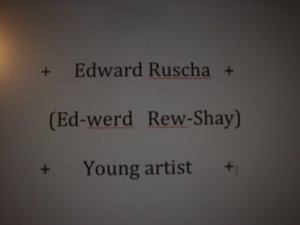Photo: Gabriella Radujko; reproduction of content on retired Edward Ruscha business card
There is no School of Edward Ruscha, but if there were, prerequisites would include an embrace of ambiguity and the spirit world–its students paraphrasing quotes such as these from his recent talk with Paul Holdengräber at the New York Public Library on March 6, 2013:
I have a deep need to make a book.
It doesn’t matter what it is about.
The idea for a book comes first.
As book artist, Ruscha challenged his interviewer and the audience. There was puzzlement among the literati, perhaps, because as book readers, according to Walter J. Ong, we humans are so literate that it is “difficult for us to conceive of an oral universe of communication or thought except as a variant of a literate universe”.
Ruscha’s practice, an alternate universe, is more rooted in oral communication than literacy and inspired by “a spirit that jumps”. Think leaping flames. It is no wonder that Ruscha is fascinated by fire or that he suggests that time for reading Holdengräber’s list of books selected with him in mind might only be possible “in another life”.
Thus was born Twentysix Gasoline Stations, his first artist’s book, published in 1963 in black and white and so named, for what exactly? “Critics want to know; what is it?” inquires Holdengräber, with emphasis on the “is”, so that it sounds like “tis it?” “What tis it?” Ruscha, of course, won’t tell what it refers to, only what it doesn’t. It is not a reference to the 26 letters in the alphabet. It is not a reference to the 26 rides (each way) hitchhiking to Florida from Oklahoma City and back again.
“There is no agenda with gas stations, says Ruscha. The title came first and then needed to be carried through. Art needs to be something that makes your scratch your head. Ambiguity is a good thing. Art needs to be wide open”.
“Ed Ruscha Books & Co.”, March 5-April 27, 2013 at Gagosian Gallery, 980 Madison Avenue, New York, NY will coincide with the publication of MIT Press’s Various Small Books: Referencing Small Books by Ed Ruscha (2013) which documents ninety-one of the books inspired by Ruscha’s own, reproducing covers and sample layouts from each, along with a detailed description.


 RSS
RSS
